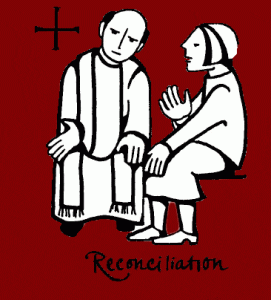This is the third of a 12-part, once-a-month series on the Fruits of the Holy Spirit. This month’s fruit is PEACE . Be sure to see previous posts beginning with CHARITY and check back next month as another contributor explores the fruit of PATIENCE.
You would not believe the uproar in my home as I sit and try to ponder peace, one of the twelve fruits of the Holy Spirit. Here I am trying to expound on something that seems to be an elusive practice in my own home. There is something very wrong with this picture of me tapping away at the keyboard and intermittently and rather loudly expressing my dismay to my children. “How can we expect to have peace in the Middle East if you two cannot even share a single toy?!” And, “Mother Theresa always said peace begins with a smile…not this tiresome bickering between you two! I am pretty sure that’s how wars start.” So, if by our fruits, we are known, then, our gig is up.

I have been reflecting on the fruit of peace to fulfill my obligation to write a blog post for Fruits of the Holy Sprit series. And, I have rather clumsily stumbled upon a few thoughts that have helped me to understand how the Holy Spirit works in our lives and what our role may be. Peace is a fruit of the Holy Spirit as opposed to a gift. The gifts of the Holy Spirit are freely given, whereas, the fruits are the observable behaviors done by those who have accepted the gifts and who have maintained a state of sanctifying grace. These concepts are at once simple and profound. And, ultimately, I have learned we have much work to do to attain God’s peace in our homes, communities, and world. We are called to be a light to the world. We are the instruments of peace, if we choose to be. The problem may be that too few of us are willing to do the work. And, fewer still understand what work we are to do.
“Peace I leave with you; My peace I give to you.”
Often, what we call peace is merely the appearance of peace or man’s attempt to avoid conflict. Peace is many things to many people. It is the trite proclamation of every aspiring beauty queen. To others, it is the perfect ending. And still others define it as a world without war. It is both a gift from God and a call to action. It is a ubiquitous desire and, yet, it seems to be so far out of reach. We live in a world where wars never seem to end. Violence and conflict dominate the headlines. Social media has become an outlet for the expression of aggression and ultimately hatred toward those who disagree with us. Discord thrives in our homes and in our communities. Divorce rates continue to soar. With such a dearth of peace, believers can fall into despair and begin to feel that the Holy Spirit has abandoned us. And in the want for peace among the faithful, detractors find cause for vindication.
“Peace be with you.”
Before Christ hands Himself over to die for us, He gives us His own body and blood as spiritual food for the journey, thereby initiating the sacrament of Holy Eucharist. Upon rising from the dead, He greetsHis disciples, who are filled with fear and a sense of abandonment, with the words, “Peace be with you.” Next, He breathes the Holy Spirit upon them. In the very next breath, Christ institutes the Sacrament of Reconciliation. These two Sacraments are gifts from God that will help us to establish His peace on earth. Yet many demonstrate, at best, a lack of gratitude and at worst a disdain and denial of the Eucharist. Often, the Holy Eucharist is received unworthily. Many are unaware of the requirements to receive the Sacrament properly. And, others avoid the Sacrament of Reconciliation because of fear and shame or they tell themselves that they don’t need to talk to a priest.
While we can always go “straight to God,” God knows that we are corporeal, as well as spiritual, beings. Therefore, he gave us the Sacraments. To confess our sins to God in the presence of a priest is the most pleasing way to express our sorrow and it is the only way to receive the sacramental graces of absolution, freedom from sin, and reconciliation with God.

I have applied this revelation to address the frequent conflicts in my home. In the past, I have lamented to my children about the reason God made the fourth commandment all about mom and dad. “The first three are about God,” I tell them. “Mom and Dad come next and don’t you forget it!” While I was correct in teaching them that breaking the commandments causes conflict, my tone was not very peaceful and eye rolls often followed. So, I decided to give each of my older children an examination of conscience to read each night before bed. I told them that this is their special time with God. I taught them to tell God they are sorry and to pray the Act of Contrition. In this way, I let them know that they can sleep peacefully, in the knowledge that they have begun the process of reconciling with God.
I have witnessed the positive transformation in family relationships, respect toward my authority, and in expressions of peace in the home. As a family, we encourage frequent Sacramental Confession. It has been a blessing on our marriage and our family. By going frequently, we stop bad habits from turning into sins that could easily destroy our marriage and divide our family. Additionally, by frequent reconciliation with God, we are prepared to worthily receive the Holy Eucharist. This way we find ourselves well rested and energized for the journey toward peace.
“Blessed are the peacemakers: for they shall be called children of God.
While participation in these two Sacraments is the most important work of peacemakers, we can do nothing without the aid of the Holy Spirit. Here is a list of other peacemaking practices that demonstrate that we have the life of the Holy Spirit dwelling within us. When we catch ourselves doing these things, we know that God is living in us and working through us.
- Practice the cardinal virtues of prudence, justice, fortitude, and temperance.
- Practice the theological virtues of faith, hope, and charity.
- Perform corporal and spiritual works of mercy.
- Forgive your enemies.
- Love your enemies.
- Prefer virtuous pursuits over sinful indulgences.
- Perform the duties of your state in life with joy and gratitude.
- Pray daily.
- Read Scripture daily.
- Smile.

